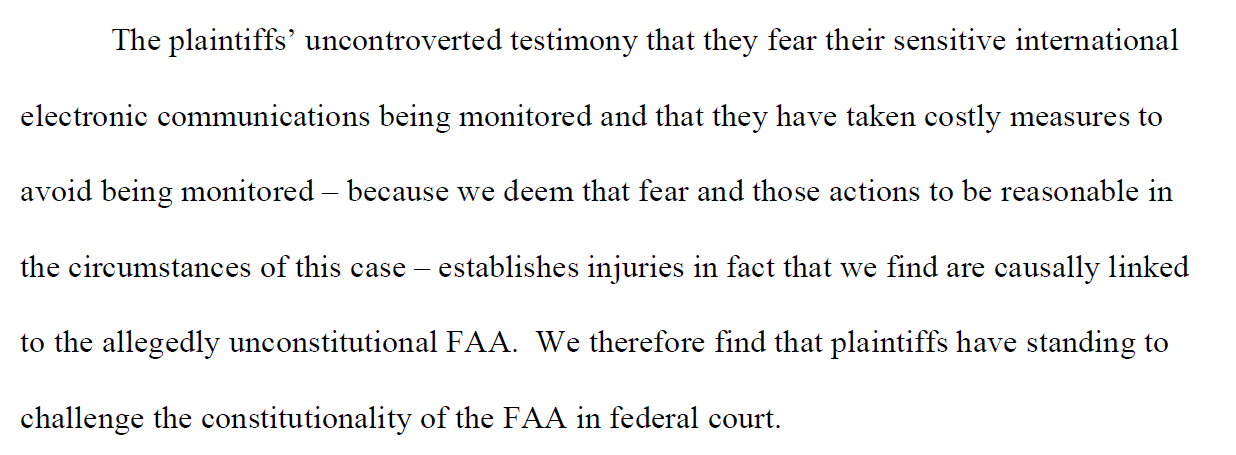(9 am. – promoted by ek hornbeck)
Cross posted from The Stars Hollow Gazette
 The 2nd Circuit Court ruled that a law suit (pdf) challenging the constitutionality of the FISA law which shields government eavesdropping from judicial review, or as Glen Greenwald says, “(places) secret executive surveillance above and beyond the rule of law”, can move forward in the courts. Finally, there will be a review of the law that Obama promised to vote against, then voted for promising to revise after he was elected and now wields with the same impunity as his predecessor to cover up war crimes and protect war criminals in the name of national security. The bill not only gives expanded eavesdropping powers without a warrant but also gave retroactive amnesty to the telecommunication companies which participated in Bush’s illegal spying program.
The 2nd Circuit Court ruled that a law suit (pdf) challenging the constitutionality of the FISA law which shields government eavesdropping from judicial review, or as Glen Greenwald says, “(places) secret executive surveillance above and beyond the rule of law”, can move forward in the courts. Finally, there will be a review of the law that Obama promised to vote against, then voted for promising to revise after he was elected and now wields with the same impunity as his predecessor to cover up war crimes and protect war criminals in the name of national security. The bill not only gives expanded eavesdropping powers without a warrant but also gave retroactive amnesty to the telecommunication companies which participated in Bush’s illegal spying program.
At Salon, Greenwald explains the law suit:
In the case brought by the ACLU, the plaintiffs were a variety of human rights activists, lawyers and journalists (including Naomi Klein and Chris Hedges), who argued that both they and their sources have a reasonable fear of being subjected to this expanded surveillance, and that fear– by rendering them unable to perform their jobs and exercise their Constitutional rights — constitutes sufficient harm to vest them with “standing” to challenge the new eavesdropping law. In response, the Bush administration argued — as always — that the plaintiffs’ inability to prove that they were actually targeted by this expanded surveillance precluded their suing; their mere “fear” of being targeted, argued the Bush DOJ, was insufficient to confer standing to sue.
In late 2008, a lower court judge granted the Bush argument and dismissed the ACLU’s lawsuit on “standing” grounds. On appeal, the Obama DOJ — needless to say — faithfully adopted exactly the Bush argument to demand dismissal of the ACLU’s lawsuit on procedural grounds of “standing,” i.e., without assessing the merits of whether this law violates the Fourth Amendment.
Yes, the Obama DOJ is now using the very same argument that was used by the Bush DOJ. But now a three judge panel ruled unanimously that the plaintiffs do have standing:

(click on image to enlarge)
It is now very clear that Obama realized, after he clinched the nomination in a back room deal that disenfranchised the delegates from Michigan and Florida, that he would most likely be the next president and began calculating. In June, 2008, Yale Law Professor Jack Balkin explains:
Barrack Obama plans to be the next President of the United States. Once he becomes President, he will be in the same position as George W. Bush: he wants all the power he needs to protect the country. Moreover, he will be the beneficiary of a Democratic-controlled Congress, and he wants to get some important legislation passed in his first two years in office.
Given these facts, why in the world would Obama oppose the current FISA compromise bill? If it’s done on Bush’s watch, he doesn’t have to worry about wasting political capital on it in the next year. Perhaps it gives a bit too much power to the executive. But he plans to be the executive, and he can institute internal checks within the Executive Branch that can keep it from violating civil liberties as he understands them. And not to put too fine a point on it, once he becomes president, he will likely see civil liberties issues from a different perspective anyway.
So, in short, from Obama’s perspective, what’s not to like?
Greenwald gives his insight on the significance of the ruling:
To allow Presidents to escape all legal challenges on “standing” grounds merely because they managed to conceal the identity of the victims of their lawbreaking would be, in essence, to have laws that apply to Presidents only in theory but not in reality.
Today’s ruling puts at least some brakes — for now — on that license of lawlessness. It rejected the Bush/Obama claim that citizens must prove they have been targeted by an illegal presidential program before they have the right to ask a court to declare it illegal. Instead, a plaintiff’s reasonable fear that their rights are being violated due to enactment of an allegedly unconstitutional law — combined with actual harm suffered as a result of that fear — suffices to allow them to challenge the legality of those actions. It is, of course, possible that the Supreme Court can review and reverse this ruling, but the Second Circuit is a well-regarded court — situated on the level immediately below the Supreme Court — and this well-reasoned decision will have significant sway. At the very least, this is an important ruling in eroding what is easily one of the worst political problems plaguing America in the post-9/11 world: the ease with which Presidents and their underlings can insulate their secret actions from the rule of law.
Thank you to the Second Circuit Court of Appeals

4 comments
Skip to comment form
Author
Read the whole article from 1990 about Obama becoming the first black presdident of the Harvard Law Review.
Obama does the same thing back then as he does now; as far as getting support of liberals, while at the same time letting conservatives know where his true intentions lie.
http://latimesblogs.latimes.co…
Obama
http://www.infowars.com/chilea…
Oh, don’t stock up on potassium iodide?http://www.infowars.com/u-s-health-authorities-urge-americans-not-to-take-potassium-iodide/
Syria?
http://cryptogon.com/?p=21407
New Songdo America
http://www.oldthinkernews.com/…